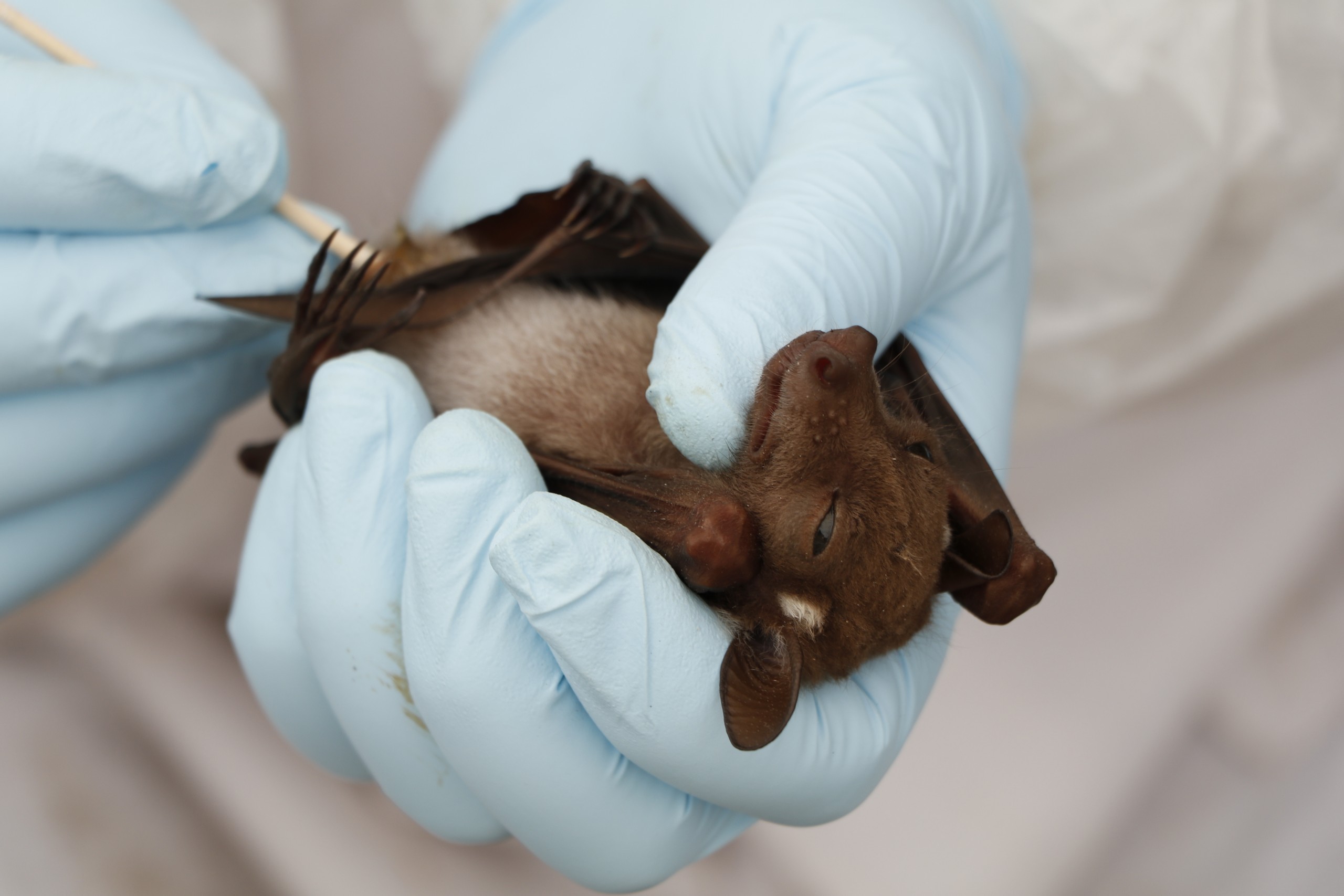With the support of the EBO-SURSY project, biologist Ndong Bass Innocent Wultof leads research missions in Cameroon to collect samples from wild bat populations to monitor for the presence of Ebola virus disease (EVD) as well as generate data for a centralized database. Building technical networks and capacities for surveillance and information-sharing while also engaging directly with communities is at the core of the EBO-SURSY project.
Before setting foot in the field for a standard two-week field mission to collect samples from fruit bats, Ndong Bass Innocent Wultof, a biologist with the Centre de Recherche des Maladies Émergentes et Réémergentes (CREMER) in Cameroon, contacts local government and traditional administration authorities of the targeted area. As part of the EBO-SURSY project, and in partnership with l’Institut de recherche pour le développement (IRD), Ndong Bass Innocent leads a team of four to one of five different locations around Cameroun at least once a month.
All of these research missions begin with community outreach sessions, explaining the purpose of his team’s presence as well as working to emphasise the risks posed by a disease that many community members see as an ‘illusion’ because Cameroon has not had a single case of Ebola Virus Disease (EVD). Working to counter this narrative, the community leader or chief works with notable community members to recruit a team of local guides that also assist with the field work. As a result of their participation, local guides enhance their understanding and ability to communicate accurate information to their peers as well as dispel myths about the sample collection process.
As a country bordered by EVD-affected nations, Cameroon is considered ‘at-risk’ and working to ensure that the systems for monitoring and detecting this zoonotic disease are functioning at maximum efficiency. While the natural reservoir of EVD remains unconfirmed, the African fruit bat is the presumed reservoir and can carry the disease without becoming infected as well as infect other animals and humans.
Knowing more about the reservoir of the virus as well as how it is transferred, allows scientists and medical professionals to enhance human health response efforts as well as to protect susceptible wildlife.
With this in mind, Ndong Bass Innocent’s team collects blood or dry blood spots, oral and rectal swabs and dried faeces from a minimum of 250 bats during each of its two-week sample collection missions around Cameroon, working primarily after sunset and before sunrise – when bats are most active. While ensuring that researchers use Personal Protective Equipment (PPE) for their own safety, the team places a special canopy net over trees and/or a harp trap in areas like forests and caves that are known to house bats, allowing them to capture, collect samples from, and then release the animals. In addition to collecting samples, the team also inspects bats for external parasites, known as ecto-parasites, which can cause disease and could be another source of interspecies transmission as well as other physical signs of illness.
Handled with care and in alignment with OIE International Standards on biosafety and biosecurity, these samples are then processed by specialised laboratories including data on their location, method of capture (harp trap or net), distance to the nearest village, feeding pattern, gender, age, size, weight, and disease status, stored in a centralized database, providing a valuable resource for researchers working on understanding Ebola transmission and identifying its reservoir or vector, an understanding of which could eventually allow for the development of more effective treatments and/or a vaccine. Data and analysis stemming from these efforts also inform policy-makers’ decision-making and allow them to understand the risks of EVD transfer to humans.
In addition to participation in field trainings facilitated by the French Agricultural Research Centre for International Development (CIRAD) and a month-long technical exchange at the Robert Koch Institute Germany in the Democratic Republic of Congo, Ndong Bass Innocent’s team cultivates collaborative relationships and seeks out opportunities for continuous professional growth wherever they are available. Multi-sectoral cooperation between animal, human and ecosystem health stakeholders within the context of the One Health approach also helps ensure the success and reinforces the impact of field missions as well as the EBO-SURSY project as a whole. In Cameroon, this means working with the Government’s Permanent Secretariat and the Zoonoses Program Technical Committee (One Health Platform) as well as a variety of Government ministries and committees like the Ministry of Agriculture and the Ministry of Wildlife as well as the Ethics and Health Committees and NGO partners such as the World Wildlife Fund (WWF), the World Conservation Society (WCS).
Photos: ©OIE/S.Muset



